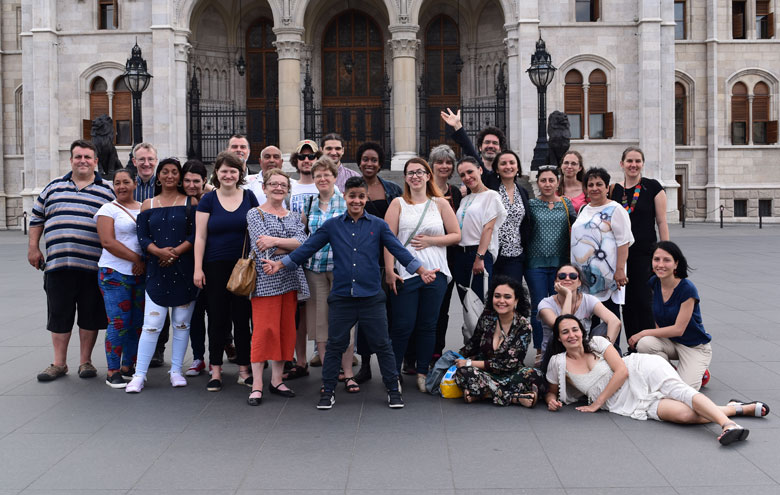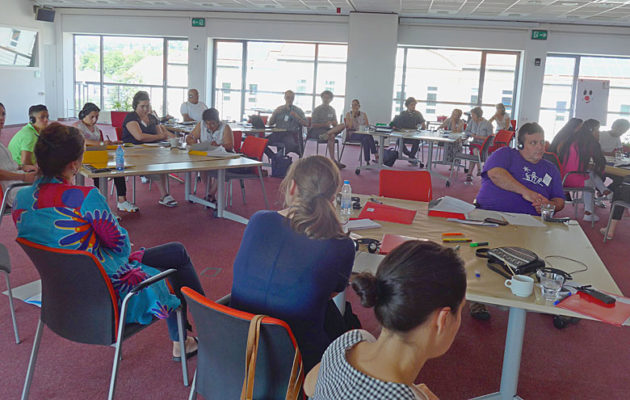Budapest Workshop 2018: “Experiencing a fairer and more caring society”
This Workshop brought together 31 people from different groups in Bulgaria, Hungary, Romania, and Serbia as well as members of ATD Fourth World from Belgium, France, Poland and the United Kingdom. The participants were from different walks of life. Some work in a group or an organization. Some are isolated and others are involved in their community and neighbourhood. They all have in mind the difficulties that people experiencing poverty are facing on a daily basis, as well as their strengths and their capacities. Each participant tries to reach out to those who do not have an opportunity to contribute to society.
The Workshop took place at the European Youth Centre in Budapest, Hungary from July 4th to July 8th with translation into five languages. Discussions focused on three main aspects of a fairer and more caring society:
– Access to education for all;
– Access to decent housing with energy, electricity, running water and heating;
– Strategies that participants had tried in order to give people access to their rights and to develop a more inclusive society.
Participants worked in focus groups and plenaries, but also used creative workshops to learn things like group drawing methodology, educational bread making methods or theatre image. Here are some important words from people who attended the event:
“We can move from a society with poverty to a fairer and more caring society by being connected to one another and to everyone, by helping others to gain access to education, and by joining the efforts of people who are living in poverty to overcome their situation.”
“Our government doesn’t see us, we are still invisible.”
About access to education
It is important to understand the obstacles that prevent children from going to school and also from learning when they are at school.
“Our recommendation is to keep parents connected to education, to identify the strengths and resources within the community and to work with them, being creative and motivated. We want to bring parents and teachers closer.”
“Another recommendation is to propose to children alternative activities in order to motivate them with the purpose of building their self-confidence. This demands a step by step approach to create achievable goals in the minds of children.”
“Educational assistants from the community are going into the neighbourhood to get the children who don’t go to school. They also speak with the mothers about what is happening at school. They are doing it in a natural way because they live in the neighbourhood and they are used to sitting and discussing with other mothers.”
About decent housing
“There has been an amendment in the law. Now the law says that it is illegal to live in the street. It is compulsory to go to a shelter, but in reality there are not enough shelter beds for everyone. This is terrible and we haven’t been able to change the government’s mind… As homeless people in Hungary, we feel intimidated now.”
“When we find ourselves challenged with something new, we can just write it up on a list that is visible for everyone. We call it “the problem map”. Then we sit down together, talk about it, choose which problem has the highest priority and quite often find a solution. Our community became united thanks to communication.”
One conclusion on this topic is that building a strong sense of community and a sense of living together is an essential step. Without it, nothing can begin. Next, other people in society need to know the problems of those who don’t have access to decent housing. Other members of civil society can support the efforts and the needs of those facing these situations as government and local authorities have their own responsibilities to respect.
Another very important conclusion is that we need to develop both a long-term strategy and a complementary short-term strategy so that people can have the opportunity to get out of their immediate difficult situation.
About strategies
“If we want to achieve the same goals, we need the voices of those at the bottom who are experiencing difficulties, but also the voices on the other side of the barrier in order to [make a change]. Otherwise we’ll remain two separate groups: us and them.”
“It takes a long time for people to express what the challenges are for them and obviously people can become discouraged in such a long process… We learn that we have to be constantly in touch with those people taking part in the project in a long term perspective.”
“It’s important that there are people from the community, from the poor areas, in each of our actions to make people living in poverty more visible. They can support their children to discover that they are like other children.”
“I am proposing football to the children and, through sports, pushing them to go to school. The work that we are doing in our neighbourhood is very difficult, but if we don’t do it who else will?”
“Offering circus or football activities to children is one of the first steps. It shows them that they are capable. But the next steps are also difficult: to make the schools more open and friendly, and to make jobs accessible… These steps together will make the school, but also the police for example, change their mind set about poverty and that will make the society change.”

In conclusion:
“All of us are feeling isolated and alone in our work. Finding each other in this place is inspiring because we now know that we are not alone in what we do. We even found ideas for cooperation in the future.”
“We saw the value of persevering, of working and not expecting for things to happen on the first try. They just won’t.”
And, finally, as Ela from Poland said, “We need to stay united, even when confrontation and conflicts may happen… There is always someone, somewhere, who is going to give support to overcome them.”
Workshop organizers felt how much the participants wanted another similar workshop. Evaluations from attendees showed that this type of workshop strengthens participants and makes it possible for them to improve their daily activities.
To know more:
– Download the Summary of the Workshop Budapest 2018
– Read the Summary of the Workshop Sofia 2016 “Towards those still missing”



